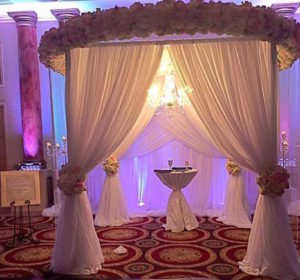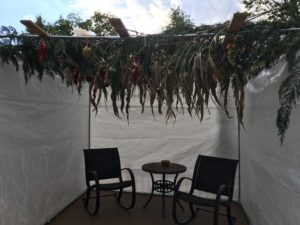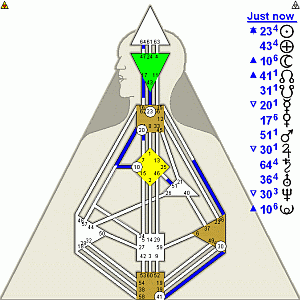May 5778 be a year of fulfillment and meaning
 When a couple marries, is the ceremony one of Solemnization or Sanctification? This is an important distinction to understand for couples getting married and for those of us doing the officiating. When an officiant solemnizes a wedding he/she duly performs a formal marriage ceremony. When an officiant sanctifies something, that something is consecrated, set apart and declared holy, or made legitimate by a binding religious sanction. It is important to see that one can perform a legitimate ceremony (solemnize) without adding the consecration. And in point of fact, officiants are often called upon to do the one without the other.
When a couple marries, is the ceremony one of Solemnization or Sanctification? This is an important distinction to understand for couples getting married and for those of us doing the officiating. When an officiant solemnizes a wedding he/she duly performs a formal marriage ceremony. When an officiant sanctifies something, that something is consecrated, set apart and declared holy, or made legitimate by a binding religious sanction. It is important to see that one can perform a legitimate ceremony (solemnize) without adding the consecration. And in point of fact, officiants are often called upon to do the one without the other.
My role as a rabbi requires that I be committed to doing both. But that does not mean that a different officiant, a layperson, for example, cannot also incorporate the holy into the ceremony. For all of us, it requires deliberate forethought to solemnize and sanctify a wedding.
If someone asks me to perform a service that uses Jewish ritual as a perfunctory overlay, I believe that still falls under the auspices of solemnized but not sanctified (and something I am uncomfortable doing). It is only when the ritual is embraced as part of the meaning making process that we can elevate the ceremony to be one of consecration.
I have long thought about this issue as couples approach me regularly. I need the couple to make a commitment to a Jewish family and future, as well as a ceremony that resonates with the couple. Every couple I work with therefore is required to invest time and effort to understanding the rituals they will include and exclude from their ceremony in addition to having the important conversations with each other to discover what each of them understands as a Jewish family and future. I serve as the lamplighter on this journey.
A young woman shared that she was asked to officiate at her sister’s wedding. The couple said it was because the sister knew them well. The couple is in love but neither is religiously affiliated or active. Given their lack of attachment to Judaism, it is likely a ceremony that I would not do. But this anecdote points to a trend towards serious, but non-religious union. I am sure that this young woman will do her utmost to provide a meaningful ceremony. However, she will need to invest much effort in order to sanctify and solemnize her sister’s wedding (I am confident that she will, and I stand ready to help her). I wonder if the fee-for-service or mail-order ministers would do justice on behalf of the couples they ostensibly serve.
Sanctification should be an important consideration for every couple seeking a meaningful ceremony. And it needs to be an issue that every officiant honestly confronts.

Being a rabbi in Turbulent Times was the theme of the annual convention of reform rabbis. Indeed we live in particularly turbulent times. But it is times like these that can give us perspective and renewed commitment to our ideals.
Life in modern America is arguably the best that Jews have ever experienced. Our liberty and prosperity are superior to any other time in our history. Our forebears fought for our place here and American Jews have now full access to the rights, privileges, and responsibilities of being a citizen. We embrace these blessings and have worked toward expanding them to include others. However, the path forward has not been smooth. There have been times when our achievements and extraordinary blessings have been threatened. But these threats are opportunities that challenge us to do better, examining our resolve and commitment to our values.
Living in turbulent times forces us to ask difficult questions. How do we champion ethics and morals, protecting and preserving them when civil conventions are challenged or dismissed as unimportant? Ethics and morals, however, remain the fabric that keeps us together, binding us, enriching us and keeping us strong. Promoting these is the work that needs to be done now more than ever; this is the seminal and imperative challenge of our time.
The contemporary American landscape has parallels in Judaism; like the Jewish people, America is a nation of laws. The law’s purpose is to create a civil society where people live together respectful of differences and all citizens enjoy equal rights and protections. These laws are also a reminder of the work yet to do. Judaism teaches that changing hearts and minds is an evolutionary process. Compassion in our tradition has developed from the laws we are commanded to follow. We pray that the teachings underlying the laws will eventually be inscribed upon our hearts, but until then, the laws guide us. We recognize these laws and uphold them.
We rely on strong institutions and deeply ingrained principles to safeguard against assaults on these laws, believing that they will withstand the pressures. However, based on the history of our people, we are naturally wary of threats to our way of life. Even for those who believe in this New World, the idea that history might again repeat itself gnaws at us. Our patriotism is deeply intertwined with our Jewish identity. Therefore we become activists to protect and preserve this remarkable American way of life against threats, foreign or domestic, internal or external.
We have learned that however strong our institutions, they require dedication and nurturing by we the people, lest they wither. So now is our time to recommit to the noble purpose that is our country. We affirm the prophetic vision of the Promised Land. Despite all the progress we have made, we know we have so much farther to travel before the dream is fully realized for all. We stand at the threshold, challenging us to move forward toward a vision of what still could be. This dream gives us the courage and the strength we need at this moment in our Jewish and American history to move onward together. So now we redouble our efforts with renewed vigor and purpose to keep forging ahead. Let us be the change we want to see.
Christmas raises the perennial questions in the American Jewish community: Can we be part of holidays that are not our own? Natalie Portman demonstrated a way for our interfaith families to do it as she explained to Jimmy Fallon on the Tonight Show, November 29, 2016 (the 28th or 29th of Cheshvan, depending).
We Jews invite others into our tent all the time. The Jewish sense of hospitality is to welcome the stranger, without regard to their particular beliefs. We welcome everyone into our Sukkah; the Shabbat dinner table is open as well. So what happens when the tables are turned? How do we accept the mitzvah of their hospitality, even when particular beliefs do not coincide with our own? When the Jewish world meets other faiths or traditions, there are borders and boundaries that need to be navigated.
How might we participate if we are not able to fully celebrate?
American Christmas begs this question. The basis for the holiday is, of course, the Christian belief in the birth of Jesus Christ. It is a powerful and beautiful message of God’s love and hopes for the world. But it is not our theology. However, the commercial interests in our country have continued to secularize the holiday and as traditional boundaries between religions have become more porous, Christmas has permeated the American landscape. All in all, a holiday dedicated to “peace on earth” and “goodwill toward men” is not a bad thing to embrace and arguably the real problem with these sentiments is that they do not endure throughout the entire year. Furthermore, although many Jews have spouses that convert to Judaism, Jews are intermarrying. Both of these realities create a space in which non-Jewish family traditions and beliefs come up against Jewish traditions and beliefs. And in an increasingly open culture, many Jews would like to enjoy the spirit of the holiday.
Christmas has become an American holiday for many, including many American Jews. The theology has been all but completely stripped away for many, and for the others, the theology is greeted as something non-threatening. The question for us is whether we engage. And if we engage, how do we do so while keeping our own sense of authenticity. For couples that come from different faith traditions, such as Natalie Portman’s, she shows us how to honor our birth families and celebrate together. Although Ms. Portman’s husband, Benjamin Millepied, converted, his family has not. The two of them have respectfully brought the two families together without sacrificing their chosen identity. For some Jews, this is not a conversation in which they care to engage. But for those of us who live in this space, and those numbers are steadily increasing, it is incumbent upon us to find ways to connect, build bridges, and find common ground. If we do, the possibilities are extraordinary.
Happy Holidays!
Leonard Cohen left us extraordinary gifts of music, poetry, and Midrash. Rabbi Sacks explicates the brilliance of Leonard Cohen and his insight through his final bequest to us, “You Want it Darker”.
Shabbat Shalom
We Jews have been scrambling a bit. Yom Kippur just ended and last night was the start of Sukkot. We only had a few days to build the Sukkah. In addition to being busy, it is a fascinating time of year. The High Holidays are an intense period of introspection. As we commit to making this New Year a meaningful one, learning from the lessons both good and bad of the past year, we keep in mind the fragility of life. Like Yom Kippur, Sukkot continues to remind us that life is precious, it is a gift and we do our best when we live each day to its fullest. One way we do that is to sit in our Sukkah, that meager shelter with the partly open roof and only three sides.
a bit. Yom Kippur just ended and last night was the start of Sukkot. We only had a few days to build the Sukkah. In addition to being busy, it is a fascinating time of year. The High Holidays are an intense period of introspection. As we commit to making this New Year a meaningful one, learning from the lessons both good and bad of the past year, we keep in mind the fragility of life. Like Yom Kippur, Sukkot continues to remind us that life is precious, it is a gift and we do our best when we live each day to its fullest. One way we do that is to sit in our Sukkah, that meager shelter with the partly open roof and only three sides.
We dwell there and invite others to join us. But this invitation is more than Jewish hospitality for we invite not only friends and family but also the spirits of those who came before us, those who embodied the highest Jewish Values. These people include our Forebears, patriarchs and matriarchs of Judaism and perhaps of our own families. Abraham and my Zeyde, Sarah and my Bubbe, and the list goes on. Each soul is an exemplar of a particular virtue such as compassion, wisdom, and courage.
These welcome guests represent the best of us. When we remember them and invite them to dwell in our Sukkah with us they come alive as a presence. We embrace them and realize indeed Zichronam Livrachah, their memories are truly both a blessing and an inspiration for us.
They enlighten us, inspire us, they connect us to the enduring nature of our people and the values that make being Jewish something so very special. May we embrace more than their presence, but may we embody the best of who they were so that we may become more than we are.
Chag Sameach!
 Mercury is in retrograde. From August 30 through September 22, Mercury is moving backward in the sky from our perspective. This is the third of four such occurrences this year according to the Old Farmer’s Almanac. Astrologers say this event is supposed to mark a time for reflection rather than new action. This is not a time for decision-making. Instead, we are to assess priorities and plan to move forward by reviewing projects and determining where to appropriately focus energy.
Mercury is in retrograde. From August 30 through September 22, Mercury is moving backward in the sky from our perspective. This is the third of four such occurrences this year according to the Old Farmer’s Almanac. Astrologers say this event is supposed to mark a time for reflection rather than new action. This is not a time for decision-making. Instead, we are to assess priorities and plan to move forward by reviewing projects and determining where to appropriately focus energy.
Elul is the month preceding Rosh Hashanah. It is our Jewish time for deep reflection and repentance as we prepare for the High Holidays. For many of us, this is our period of Teshuva, the “return to God” that requires seeking and granting forgiveness as we strive to understand where we went astray and how we can get back on the path of living a meaningful righteous life.
I’m not suggesting that there is some equivalence between Astrology and Judaism or that the early astrologers were Jews. But I believe that making time to take stock of whom we are is of utmost importance to finding fulfillment. The unexamined life is not worth living, so teaches Socrates in Plato’s Apology. So many of us are consumed by the day-to-day issues of living, sometimes, it is all but impossible to step back and assess where we are and where we are going.
In life we often awake to find we have been blown off course. Anyone who has ever piloted a plane or a boat knows navigation is an ongoing process of course corrections, so too life. Currents and tides constantly push us off course and our aim has to compensate if we are ever to arrive at our destination. For some of us, we don’t even take the time to determine what our destination might be. For all of us Elul is an appointed time to engage in the process.
As we approach these High Holidays may you find forgiveness for those who have offended you, be forgiven by those whom you have offended and find your true path of meaning, relationships, and fulfillment.
L’Shana tova
It is Spring, Pesach and time again to launch another season of “Ask the Rabbi.”
The hardest part about this “Ask the Rabbi” experience was actually mustering up the courage to go and sit down with my little sign announcing my presence. Once I got over my own fears, I did it. I took up residence in my space. I sat down, pulled out my sign and waited for an opportunity. A shaded table, a smile and a sincere hello are the key ingredients to this recipe.
A person might ask “Why do I do this?” (go ahead, I’ll wait) Simply, it seems like a good idea. I am out in my community trying to be friendly, to connect to people where they are. There are no expectations. It’s just me and another empty chair inviting people to join me. Reactions run the gamut from ignoring me to embracing me. But here I am.
I am here because I met a friend and colleague for coffee not too long ago and we spent much of our time together saying hello to people we knew and introducing each other and engaging in pleasant conversation. It got me to thinking about what this might look like to purposefully be present. Interestingly, other colleagues particularly my fellow friends in Rabbis Without Borders were thinking along similar lines. Most notably Rabbi Michael and Rabbi Ari have posted their experiences. (and special kudos to Rabbi Michael for getting the TV publicity and raising awareness of his work.)
We are going to where the people are instead of waiting for them to come through our doors, open as they may be. And it sends a message that we are out and present in the day-to-day encounters, not solely the ritual events, meetings and conferences we attend, or our institutions. We are just out here saying hello, sharing some time and welcoming another’s presence, starting a conversation and perhaps a journey together.
So, Come! Ask the Rabbi!
April 15 will be the final day in the life of Temple Beth El in Spring Valley. That was my home growing up. She has merged with another and is now part of the new Reform Temple of Rockland County. Her time has passed, but it is so difficult to say goodbye to a place that is so much a part of me. I learned so much there, developed friendships that still endure, knowledge of my heritage that connects me, a lens through which to look at life and understand it, giving me the foundation upon which to build a meaningful life. It was in this place that I learned about things greater than myself, what it meant to be Jewish, what it meant to be a mensch. My rabbi, Rabbi Frishman z”l, and my cantor, Cantor Weinflash z”l, were towering figures then and still serve as guides along my path. Saying goodbye to this special place is very hard.
The building was much more than a structure; in many ways it was as much home to me as the place I went to lay my head at night. Temple was a place of extraordinary and wonderful experiences. I learned in the classrooms and to teach there as well, to sing in the choir box, to pray in the pews, to engage in the community, to champion important values and causes, to learn about culture and art, to develop a love of Israel and the Jewish people, to ponder great questions and explore the answers, to find meaning under the watchful care of those who loved and nurtured me.
At Temple I became Bar Mitzvah and was married. At Temple I said goodbye to my parents. Our family names adorn the honor wall and Yahrzeit plaques, my dad’s name on the panel of presidents, pictures of me and my brother and sister standing on the bima as part of our confirmation classes, art contributed by my parents, and on and on and on. Words alone are inadequate to express the depth of my emotional attachment this place represents. Almost every corner of the building has a memory of my time there growing up. I am truly blessed to have been there and been a part of it.
On April 15, we will gather one last time in the Sanctuary of Temple to welcome Shabbat and celebrate a place so many of us called home. Temple Beth El lives on in the people who received the gifts from being involved there. Times change and once useful buildings can outlive their purpose, but the relationships and the beauty created in this special place will endure. This is the blessing of Temple bestowed upon us.